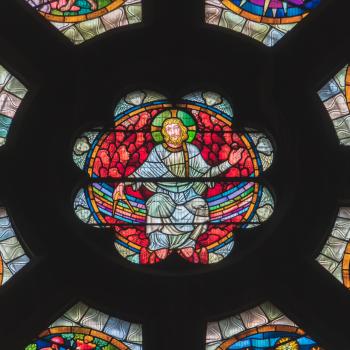
Did you know: Though Halloween is often berated by Ultra-Conservative Christians as a negative or even “Satanic” holiday, for much of Christian history, the day has been a staple Christian celebration.
What’s more: Halloween, in its Christian tradition, stems from the Bible.
For most, especially those who hate Halloween, those two points may sound ridiculous. Yet, it’s the truth.
HOW HALLOWEEN BECAME CHRISTIAN
Halloween’s growth from pagan holiday to Christian celebration was a fascinating one, and most intriguingly, a biblical one.
These later Medieval Christians decided that instead of allowing what they believed to be Pagan superstitions to control the narrative of an entire day, they would create a rival holiday known as All Hallows Day or All Saints Day.
This Christian holiday was variously celebrated on different days at first (it began on May 13, 609 C.E.).
But what did it celebrate?
Two things regarding background first:
- These later Christians, influenced by Greek philosophers such as Plato, had come to believe that humans had an immortal soul (a new idea foreign to the Old & New Testament)
- Christians, as a result of their new belief in the Greek concept of an immortal soul, developed a belief in the idea that Good Souls go to Heaven while Bad Souls go to Hell.
Because these Christians believed that their fellow dead Christian brothers and sisters were currently in heaven, they imagined that just as the angels were said to congregate with the church during worship, so too might the heroes of the Church do the same.
The holiday of All Hallows Day thus was spent in memory of the deceased saints or heroes of the church, both in scripture and recent history.
It was intended by these Christians to be a day in which people did not fear that dead spirits or witches would come to harm them, but rather were united in the Holy Spirit with those of the larger body of Christ (from all time), united in the hope of Christ.
Then, over time, the day changed to November 1 and in 800, a new holiday emerged for the night before All Hallows Day: All Hallows Eve.
This name eventually came to be shortened to Halloween.
During the time of the 11th century, the church began to spend much more time focusing on the issue of Heaven and Hell. Their conclusion was that for some people, who die repentant but without the necessary time to make amends, God must purify their soul before it can enter Heaven.
This place or status of purification (a place which is neither Heaven nor Hell) came to be called Purgatory.
And so, Halloween emerged as a night for Christians to pray for the souls of those who were deceased and still in a state of purification.
That’s how Halloween started in the Christian tradition: as a long night of prayer.
You might be wondering: how did the Early Christians find justification for their new celebration? In Scripture of course!
Which brings us to another important point: these later Christians, like most Christians today (2/3 actually), had a larger Bible than Protestant believers do today.
Like the majority of all Christians worldwide today, their Old Testament back then contained books such as 1 and 2 Maccabees.
Small note: Protestant Bibles used to contain these books as well for most of their history, but they were removed following a financial decision in 1827, eventually disappearing from most Protestant American Bibles by 1900.
HALLOWEEN AND PURGATORY
Halloween’s night of prayer was directly inspired by a story contained in their Bibles.
The story is found in 2 Maccabees 12:39-45, in which Judas Maccabaeus (the guy who started the Jewish holiday of Hanukkah) was said to have discovered idols among his dead soldiers after a battle attempting to free Jerusalem.
The story reveals that Judas and his fellow men believed that their brothers had died in battle because they lacked faith in God and so the story tells us that they began to pray:
42 and they turned to supplication, praying that the sin that had been committed might be wholly blotted out… 43 He also took up a collection, man by man, to the amount of two thousand drachmas of silver, and sent it to Jerusalem to provide for a sin offering. In doing this he acted very well and honorably, taking account of the resurrection. 44 For if he were not expecting that those who had fallen would rise again, it would have been superfluous and foolish to pray for the dead. 45 But if he was looking to the splendid reward that is laid up for those who fall asleep in godliness, it was a holy and pious thought. Therefore he made atonement for the dead, so that they might be delivered from their sin. (NRSV)
There are a few things we should note about this story:
- The above story has nothing to do with purgatory.
- The above story assumes that the dead remain unconscious until they are resurrected.
- The above story praises belief in a continued life on earth through a resurrection, not a spiritual life in Heaven (which is never mentioned).
- The story does not confirm whether Judas was successful in his idea, but merely states that it was a “pious thought” and “might” lead to success.
The Christians of the 11th century however ignored those facts and interpreted the story as a reference to purgatory. They believed that like Judas, they should pray for those who had passed away in order to show their love for them.
That story above was then combined with the admonition of James 5:16 (NRSV):
“… pray for one another, so that you may be healed. The prayer of the righteous is powerful and effective.”
As such, these Christians began Halloween as a tradition of praying for those suffering or waiting in Purgatory, with the following day reserved as a celebration of the dead saints who were already in Heaven.
MARTIN LUTHER AND HALLOWEEN
Later, Halloween and more importantly, the concept of Purgatory, had grown in terms of their theory and practice.
Again, inspired by 2 Maccabees’ account of Judas paying money along with their prayers, the Christians of the 15th century had begun to pay something called “indulgences,” a payment of money which in theory, it was believed, could help someone speed up their time in Purgatory.
When Luther nailed his thesis on October 31st, Halloween, it was for a good reason: he wanted it made clear that indulgences weren’t going to help the dead.
In his opinion, the ideas revolving around Purgatory and Halloween had grown out of hand.
He knew there was no good biblical foundation for the idea (not even in 2 Maccabees itself!) and he saw the Church’s tradition as merely robbing money from people who were already too poor as it was.
Halloween had turned into a holiday that harmed the poor and Luther pushed back.
As Luther wrote himself in his 95 Thesis:
“…He Who Helps the Poor or Lends to the Needy Does a Better Deed Than He Who Buys Indulgences.“
This is why Halloween is also known to some as Reformation Day, the day Luther took back Halloween and helped launch what would be later known as the Reformation, leading to the development of every Protestant denomination in existence.
HALLOWEEN’S PROTESTANT TRADITION
In some sense, Luther saved Halloween and attempted to return it back to the day of honor it was meant to symbolize.
He freed Christians from having to spend money on Halloween for something they had no control over.
Likewise, he eventually came to remove the frightening imagery of tortured souls dwelling in Purgatory, allowing families to rest at ease that the fate of the soul rest only with God alone.
Nothing they did, after a soul’s death, would be a deciding factor in its own eventual fate.
Suddenly Christians could now see Halloween as a positive day… or so it seemed.
Unfortunately, that’s not exactly what happened.
Protestants became split into two categories after Luther’s death:
- Some believed, now without having the doctrine of Purgatory, that the spirits on Halloween weren’t loved ones but evil demons. These Protestants became fearful of October 31st and became superstitious about how to avoid harm on that day from roaming ghosts.
- Other Protestants continued to believe that the holiday was Christian and a celebration of life and death, and as such, developed more traditions in the years that followed.
Ignoring group #1, which seem oddly similar to today’s ultra-conservatives, let’s examine group #2 and one of Protestantism’s most interesting Halloween traditions: Trick-or-Treating.
HALLOWEEN AND THE POOR
There is one unique and fascinating tradition in Halloween that has been sadly distorted by today’s commercialization the holiday has deteriorated into.
The tradition of Trick-or-Treating, although perhaps having some roots in older traditions, appears to have began primarily as a result of the Medieval Christian celebration, not Pagan.
In Ireland and Scotland, as far back as the 16th century, the idea was known as Guising. In Britain, Germany and the rest of Europe, the same idea was knowing as Mumming or Souling.
At a time in which most people were poor, the children of the mostly impoverished families would go door to door of the wealthy dressed in costumes.
They would often perform a “trick,” a recital of a poem or party trick that they had learned to impress the home owner. Another tradition was for the children to promise to pray for the wealthy and their friends in return for a gift.
The wealthy would then give either “soul cakes,” various food or even money to the children, items which would help their families to keep living and not join the spirits of the dead.
Another unique fact about this tradition was how the children would sometimes warn the household that if the wealthy did not provide something for them because of their cold hearts, they would be visited with judgment.
This is partly where the tradition of dressing up as fantastic creatures came from, to represent the horrors of the coming divine judgment on the wealthy who forsook the needy.
THE BIBLICAL ROOTS OF TRICK OR TREATING
The above descriptions of Guising/Souling reverberate with echoes from the Biblical tradition.
The warning the children give the wealthy echoes Proverbs 28:27:
No one who gives to the poor will ever go short, but whoever closes his eyes will have curses in plenty. (NJB)
Or 21:13, which states:
Those who shut their ears to the cry of the poor will themselves call out and not be answered. (NAB)
And Jesus warned explicitly in Matthew 5:42 that:
Give to everyone who begs from you, and do not refuse anyone who wants to borrow from you. (NRSV)
Likewise, the tradition of some of these poor children dressing up as demonic creatures recalls the fate Jesus promises shall be given to those who neglect the poor (Matthew 25:41-46).
“Then he will say to those at his left hand, ‘You that are accursed, depart from me into the eternal fire prepared for the devil and his angels; 42 for I was hungry and you gave me no food, I was thirsty and you gave me nothing to drink, 43 I was a stranger and you did not welcome me, naked and you did not give me clothing, sick and in prison and you did not visit me.’ 44 Then they also will answer, ‘Lord, when was it that we saw you hungry or thirsty or a stranger or naked or sick or in prison, and did not take care of you?’ 45 Then he will answer them, ‘Truly I tell you, just as you did not do it to one of the least of these, you did not do it to me.’ 46 And these will go away into eternal punishment, but the righteous into eternal life.” (NRSV)
Notice that Jesus warns about “the least of these,” which is both a reference to poverty as well as an invocation of the imagery of childhood. This may, in part, be the reason for why children, instead of primarily adults, were sent out to the wealthy homes.
A TRUE CHRISTIAN HALLOWEEN
Today, Western products of the Reformation, we’ve lost all the old meaning the evening of Halloween held.
The practice of commercializing the day for the benefit of a few at the expense of many has continued, with indulgences replaced by overpriced candy, costumes and parties.
Instead of paying money to help loved ones (however fruitless the efforts truly were), people now knowingly pay money for temporary and largely self-centered purposes.
However, a question we need to be asking: is this truly all Halloween can be?
Is it destined to eventually die a meaningless death?
Or… instead of letting it die, perhaps we as Christians should attempt to reinvent it again?
Few celebrate Halloween as the Christian holiday of prayer it was intended to be and few remember Martin Luther and the symbolic act he partook in on that day by eventually helping to return the money to the poor who needed it.
At its core then, knowing this history, Halloween is a Christian holiday which should highlight the plight of the poor.
It was on behalf of the poor Martin Luther reclaimed the day and it was on behalf of the poor that Halloween’s central modern tradition of Trick-or-Treating began.
It’s biblical tradition and foundation is found more in the verses of Proverbs and Jesus’ admonitions in Matthew, than it is in 2 Maccabees.
Yet, we’ve allowed this important tradition to disappear. We’ve allowed the desire for profit and wealth to turn a holiday meant to benefit the poor into a holiday that further increases the profits of the greedy.
This is only my humble suggestion, but if we are to reclaim Halloween as a Christian holiday, let us start with these three points.
- Halloween is a night of prayer and thanksgiving.
- Halloween is a night of giving and charity, the means by which we live out our prayer and show our thanksgiving.
- Halloween is a night of renewed hope in Christ’s act of conquering the grave and as Paul mentions, the principalities and powers of the world. As such, Christians give charity to others in remembrance of how Christ gave himself in death to others.
How might such a new envisioning of this holiday look like with this new Christ-like focus?
No one knows yet, least of all me, but it seems to me that such a vision is a worthy one for us to consider pursuing.
The words of 1 John 3:17-18 should be in all our minds:
If anyone is well-off in worldly possessions and sees his brother in need but closes his heart to him, how can the love of God be remaining in him? 18 Children, our love must be not just words or mere talk, but something active and genuine. (NJB)
This Halloween, continue to give candy to the children.
Let your children dress up as the heroes they watch on TV.
But perhaps, to truly celebrate, give something to the children and their families too poor to buy a costume.
And remind your child who those heroes are supposed to protect: the least of these.
 Matthew J. Korpman is a minister-in-training, Young Adult novelist and published researcher in Biblical Studies. A graduating quadruple major at the H.M.S. Richards Divinity School, completing degrees in fields such as Religious Studies, Philosophy and Archaeology, he is an active member of the Seventh-day Adventist church whose research interests include everything from the Apocrypha to the Apocalypse.
Matthew J. Korpman is a minister-in-training, Young Adult novelist and published researcher in Biblical Studies. A graduating quadruple major at the H.M.S. Richards Divinity School, completing degrees in fields such as Religious Studies, Philosophy and Archaeology, he is an active member of the Seventh-day Adventist church whose research interests include everything from the Apocrypha to the Apocalypse.












